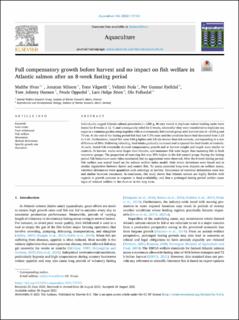| dc.description.abstract | Individually tagged Atlantic salmon postsmolts (≈1200 g, 46 cm) reared in triplicate indoor holding tanks were fasted for 8 weeks at 12 °C and subsequently refed for 5 weeks, whereafter they were transferred to triplicate sea cages in a common garden setup together with a continuously fed control group until harvest size of ≈6100 g and 73 cm. At the end of the fasting period fish had lost 7.3% mass and the condition factor had decreased from 1.23 to 1.06. Furthermore, fasted fish were 544 g lighter and 3.8 cm shorter than fed controls, corresponding to a size difference of 50%. Following refeeding, feed intake gradually increased and surpassed the feed intake of controls. As such, fasted fish eventually showed compensatory growth and at harvest weight and length were similar to controls. At harvest, males were larger than females, and immature fish were larger than maturing fish in both treatment groups. The proportion of maturing fish was 25% higher in the fed control group. During the fasting period fish behaviours were video monitored, but no aggressions were observed. After the 8-week fasting period, fish welfare was scored based on the salmon welfare index model. Only minor deviations were found and at similar regularities between fasted and control fish. To assess potential long-term impacts on welfare status, vertebral deformities were quantified with radiology at harvest. Occurrence of vertebral deformities were low and similar between treatments. In conclusion, this study shows that Atlantic salmon are highly flexible with regards to growth patterns in response to food availability, and that a prolonged fasting period neither cause signs of reduced welfare in the short or in the long term. | en_US |
